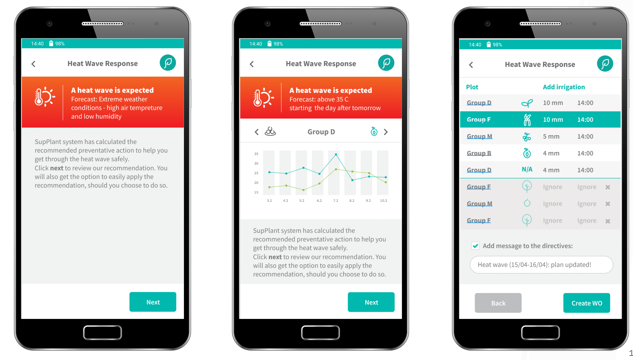SupPlant is an Internet of Trees solution dramatically reducing irrigation needs for thirsty crops – TechCrunch
Agtech startup SupPlant‘s flagship product is, essentially, a Babel fish for plants: leveraging a set of hardware sensors, the plants can tell you whether they’ve been drinking enough water, or whether they could do with an additional sip or two. In a world where under-watering has far more damaging results than over-watering, a non-tech-enabled farmer may be tempted to keep the soil wetter than it needs to — wasting a tremendous amount of precious water in the process. By carefully measuring the plants, and pairing their status with weather and soil data, it can give very precise watering needs. The company just raised $27 million to continue fertilizing and watering its own growth trajectory.
When the agricultural revolution happened 12,000 years ago, farmers started tracking how crops grew based on various weather patterns and broad-stroke variability in weather forecasting, etc. A lot of these patterns are being disrupted by climate change.
“The ability to make decisions based on seasonality of the weather is literally getting lost — that’s where we come in. By sensing the plant we can identify exactly what it needs regardless of the season,” explains Ori Ben Ner, CEO, and founder at SupPlant, who is a third-generation farmer. He admits that his grandfather — who is 91 this year and still grows onions, watermelons and corn — would barely recognize what he does as farming.
The company has two products; a software-only solution, and a hardware-and-software product. The hardware product measures one plant per 25 acres or so, and uses this data to extrapolate the needs of all the crops in the field. The solution uses five different sensors — deep soil, shallow soil, trunk, leaf and fruit. Each of the sensors feeds data into an algorithm, which also takes into consideration weather patterns, weather forecasts, soil information and other proprietary data, to give advice about how to water crops strategically over the next 10-14 days.
“We learned the specific patterns of the trunk and — later on the season — of the fruit itself through tweaking the irrigation recommendations that we’re giving. Our system learns the optimal patterns and irrigation regimes. It keeps the plant and fruit on the maximized growth pattern that the plant is capable of,” explains Ner. “From there, it starts to get into specifics of their specific regimes to increase sugar levels. For wine grape growers, for example, you want to stress the plant at a certain time, three weeks from now, to encourage the plant to accumulate sugar. The more sugar in the grape, the better the wine. Basically, the end result is dramatic enhancements of yields. Our main goal is to increase and enhance produce, but the byproduct is that we save a lot of water.”
The company closed a $27 million round led by Red Dot Capital, with participation from strategic philanthropy investors Menomadin Foundation, Smart Agro Fund and others. The round brings SupPlants’s total funding to date to more than $45 million. The company currently has 70 or so employees and is planning to grow to 100+ this year.
In addition to the hardware-based product, the company recently launched an API product, a sensor-less technology that has served 500,000 maize farmers in Kenya over the last season. SupPlant is making its technology available to these smallholder farmers by changing the basic concept of irrigation methods. The new technology is designed for the world’s 450 million small growers. In 2022, SupPlant’s aim is to get more than a million African and Indian smallholders on its platform.

The SupPlant app can help farmers figure out how to respond to extreme weather events to help give plants as good a chance to thrive as possible. Image Credits: SupPlant
“After a couple of years on the market, and with tens of thousands of sensors deployed, we have millions of irrigation events, covering more than 33 crops, with over 200 varieties in any geography you can imagine, and in every climate condition you can imagine. So the fundamental value of the product today is the fact that we own the most unique database of irrigation on Earth. The hardware will be an enabler for that,” explains Ner. Obviously, the hardware solution is more accurate than software alone, but as the company gathers more and more data, it is able to extrapolate how various crops will perform. “Our main markets — that is, where most of the sales teams are located — are Australia, Mexico, South Africa and Argentina. We are just on the verge after a super successful proof-of-concept, of signing 100% of the dates in UAE. That comprises 2.1 million trees. Our solution enables the UAE to save 70% of its water consumption. The amount that we are able to save per tree is the consumption of 10 people in the Emirates — one of the aridest places on earth.”

Pingback: Food Recipes
Pingback: รีวิวเกมสล็อต